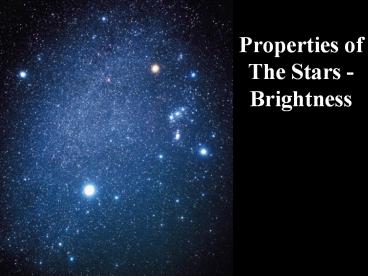Properties of The Stars - Brightness - PowerPoint PPT Presentation
1 / 23
Title: Properties of The Stars - Brightness
1
Properties of The Stars - Brightness
2
Do all stars appear the same? How are they
different? Which one looks the coolest?
Hottest? Are they all the same brightness? Do
they all look the same size?
3
As the Sun sets, some stars are visible. These
are the first magnitude stars. Later, when
twilight is over, more stars are visible. These
are the second magnitude stars, and so on
4
Two Kinds of Brightness
- Apparent Magnitude How bright the object appears
to us on Earth. - Absolute Magnitude How bright a star actually
is, its intrinsic brightness
5
Apparent Magnitude is a number that represents
the apparent brightness of stars as seen on
Earth The larger the number the dimmer the
object will appear from EarthNote we use the
letter m for apparent magnitude
6
Apparent Magnitudes
- Which would look brighter?
- Sirius, m -1.4
- Venus, m -4.4
- Which would look brighter?
- Vega, m 0.03
- Antares, m 1.06
7
Apparent Magnitudes
- Which would look brighter?
- Sirius, m -1.4
- Venus, m -4.4
- Which would look brighter?
- Vega, m 0.03
- Antares, m 1.06
8
Smaller/negative numbers correspond to BRIGHTER
stars and Bigger/positive numbers correspond to
DIMMER stars
9
Why do stars in the night sky appear considerably
different in brightness?
- The distance to stars are not all the same.
Some stars are intrinsically brighter than others
they simply give off more light.
10
Which star looks like it is giving off more light?
- But, which star is actually giving off more light?
11
How bright a star appears depends on both how
much light it releases (its actual brightness or
luminosity) and how far away it is (distance)
according to the inverse square law
12
The Inverse Square Law
- Recall how the force of gravity works
- Fgrav Gm1 x m2 /r2
- Apparent brightness also decreases as 1/ r2 so as
distance distance doubles brightness is
decreased by 1/4 - distance halves brightness increases by 4 times
13
Problem
- Rigel (m -0.01)
- Spica (m 1.0)
- Which looks brighter from Earth?
14
- Rigel (m -0.01)
- Spica (m 1.0)
- Which looks brighter? Rigel
BUT... It turns out that Spica actually gives off
1000 times more light than Rigel!! SO..If Spica
is giving off more light, why would it appear
dimmer in the sky here at Earth?
ANSWER Because Spica is much farther away from
Earth than Rigel!!
15
PROBLEM stars are at different distances from
Earth and so its hard to know which stars are
ACTUALLY brighter versus which APPEAR bright
SOLUTION We imagine having them all lined up
together at the same distance (10 parsecs or 32
light years), then compare the brightness of each
star
16
SOLUTION We imagine having them all lined up
together at the same distance (10 parsecs or 32
light years), then compare the brightness of each
star This allows us to determine how bright the
star actually is the Absolute Magnitude of the
star - M
17
ABSOLUTE MAGNITUDE or M a number that
represent the ACTUAL Brightness or Luminosity of
a Star
18
Absolute Magnitudes M- compares the brightness
of all the stars as if they were all the same
distance away from Earth (10 pc (32.6
light-years) and gives a number that indicates
the actual brightness or luminosity of the star.
19
Compare some stars
- Absolute Apparent
- MSun 4.8 mSun -26
- MSirius 1.4 mSirius -1.46
- MBetelgeuse -5.6 mBetelgeuse 0.50
Which star looks brightest from Earth?Which
star is brightest?
20
By comparing the apparent (m) and absolute
magnitude (M) numbers we can estimate a stars
distance from Earth.
- When m M, then the star is located exactly 10
pc away - When mltM, then the star appears brighter than it
would if it were 10 pc away so it must be closer
than 10 pc - When mgtM, then the star appears dimmer than it
would if it were 10 pc away so it must be farther
than 10pc
21
By comparing the apparent (m) and absolute
magnitude (M) numbers we can estimate a stars
distance from Earth.
- OR
- m M, then the distance 10 pc
- m lt M, then the distance lt 10 pc
- m gt M, then the distance gt 10 pc
22
Compare some stars
- Absolute Apparent
- MSun 4.8 mSun -26
- MSirius 1.4 mSirius -1.46
- MBetelgeuse -5.6 mBetelgeuse 0.50
Which star looks brightest from Earth?Which star
is brightest?Which is closest? Farthest?
23
Lecture Tutorial (pg 67) Apparent and Absolute
Magnitudes of Stars
- Work with a partner!
- Read the instructions and questions carefully.
- Discuss the concepts and your answers with one
another. Take time to understand it now!!!! - Come to a consensus answer you both agree on.
- If you get stuck or are not sure of your answer,
ask another group.































